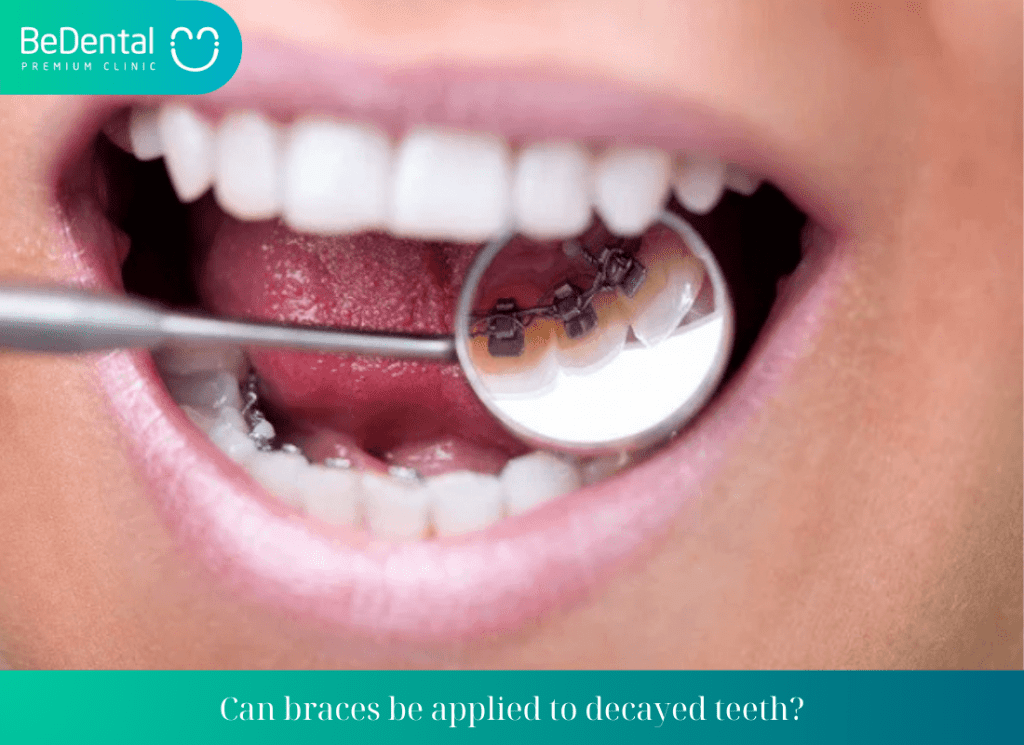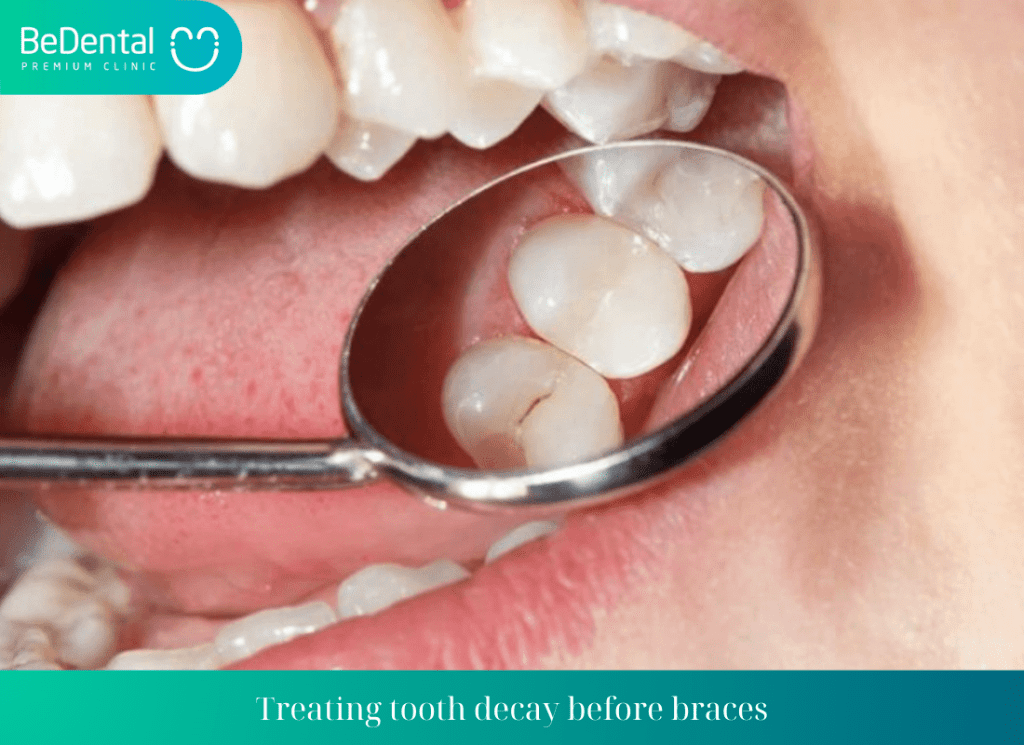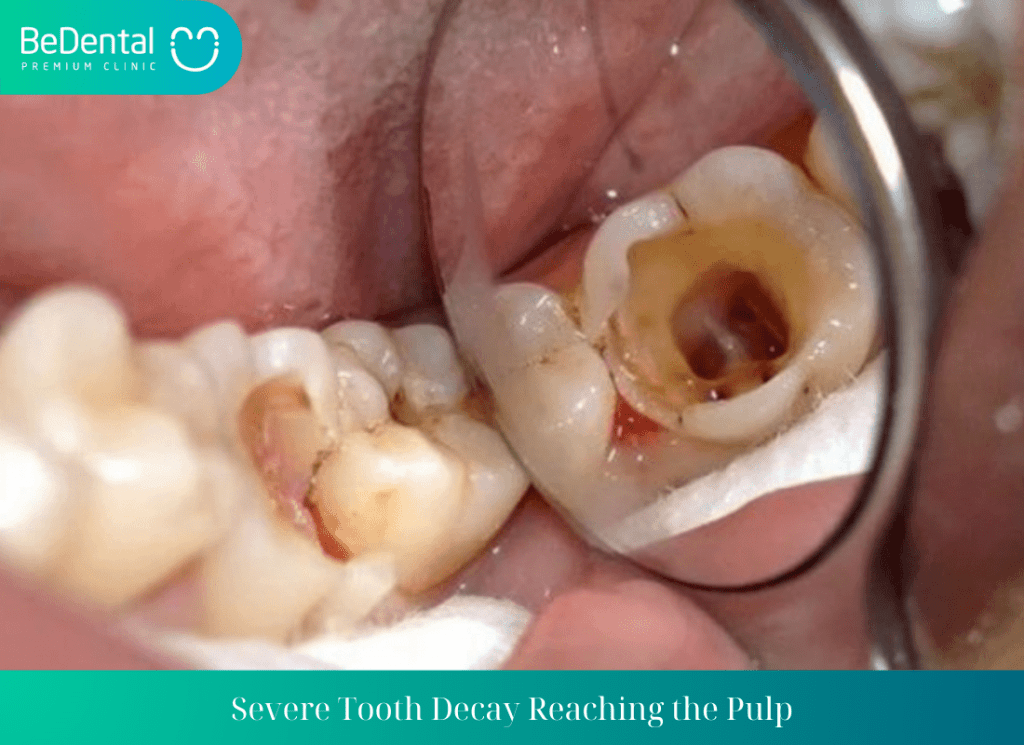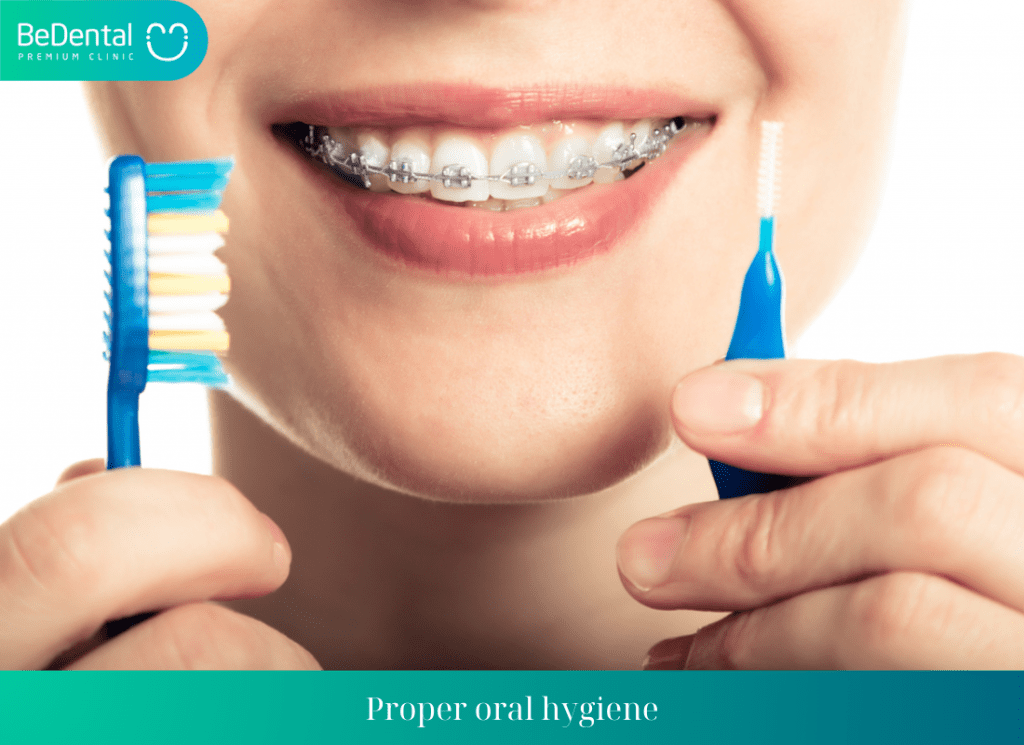The oral health condition plays a crucial role in the success of the braces process. Therefore, when teeth are deeply impacted, many people worry and wonder if they can still get braces. Let’s explore the answer to the question ‘Can cavities be braced?’ through the following article.
Appearance of deep cavities on teeth
Bacteria attack and create cavities on teeth or gaps between teeth, causing food debris to get stuck easily. If you do not clean the plaque, it will create favorable conditions for bacteria to grow rapidly. This is one of the most specific signs of tooth decay. You need to see a dentist to fill the cavities before the bacteria penetrate deep into the tooth pulp. Tooth decay is a common issue that affects both adults and children. If left untreated, it can impact oral health, leading to toothaches, infections, or tooth loss.
See more: Bone resorption when wearing braces
Can cavities be braced?
Tooth decay occurs when bacteria in the mouth produce acid that attacks the tooth enamel, causing damage and destruction of the tooth’s hard tissue structure. Initially, this condition develops silently without clear symptoms. It is often detected when there are visible damages on the tooth surface.
Failure to treat tooth decay promptly can cause many difficulties in eating and have other significant impacts. Therefore, many people are concerned about whether braces can be applied to decayed teeth.

In fact, braces are still feasible in cases of tooth decay; however, the treatment plan will depend on the severity of tooth decay in each specific case. Nonetheless, before getting braces, it is crucial to treat tooth decay to the endpoint to ensure oral health and create more favorable, effective conditions for the braces treatment process.
Below are specific reasons why treating tooth decay before getting braces is necessary:
- Decayed teeth are due to tooth tissue being destroyed, so decayed teeth will be weaker than healthy teeth. Therefore, decayed teeth are not strong enough to withstand the pulling force when getting braces. Without treating the disease before getting braces, there is a risk of teeth breaking or even tooth loss.
- Tooth decay also causes throbbing and sharp pain. Therefore, if you have to endure pain from tooth decay and pain from braces at the same time, this will greatly affect your health and increase discomfort.
- In particular, the braces process lasts from 1 to 2 years, while tooth decay needs timely treatment to prevent it from becoming more serious. Not treating tooth decay before getting braces may increase the risk of oral problems and negatively impact the braces process and final results.
See more: Will braces cause protrusion?
Treating tooth decay before braces
The dentist will assess the condition of tooth decay to determine the appropriate treatment plan, following the principles of preserving tooth tissue to the maximum, minimizing the impact on the tooth pulp and surrounding soft tissues.
The dentist will evaluate the depth and extent of tooth decay to decide whether conservative methods such as teeth cleaning, using decay-preventing agents, or tooth enamel restoration can be applied. If tooth decay has affected the tooth pulp, treatments such as dental crowns, root canals, or dental implants may be necessary to repair the damage and restore oral function.
Mild tooth decay cases
In cases of mild tooth decay, the dentist will require treatment before getting braces to ensure that the spread of tooth decay does not impact other healthy teeth and does not have negative effects on the braces process.
If the decayed tooth only shows small black spots, the dentist will supplement with fluoride. In cases of slightly larger decayed areas, the dentist will remove the decay and perform tooth fillings. After treating tooth decay, the braces process can begin.

Severe Tooth Decay Reaching the Pulp
See more: Do braces change the jawbone
Case of Extensive Tooth Damage

If the dentist assesses that there is enough remaining tooth structure to support dental crowns, the treatment process will include treating the tooth decay and then restoring the tooth using dental crowns combined with orthodontic treatment.
However, if the tooth structure is severely compromised and cannot be restored with dental crowns, the dentist may decide to extract the tooth. Subsequently, an appropriate treatment plan will be applied based on the patient’s treatment protocol.
Can decayed teeth be orthodontically treated?
You do not need to worry about the orthodontic treatment affecting the dental fillings after filling deep cavities. The pulling force from orthodontic appliances does not significantly impact the area where your teeth are filled. This is because the material usually used for fillings is Composite, a relatively hard and impact-resistant material.
See more: All about lower jaw braces
Furthermore, it is important to understand that orthodontic treatment involves moving the entire tooth and root simultaneously, rather than squeezing or compressing the tooth structure. Therefore, orthodontic treatment almost does not subject the fillings to excessive force.
How to prevent cavities during orthodontic treatment?
How to prevent cavities during orthodontic treatment? During orthodontic treatment, there are limitations on oral hygiene, which can lead to plaque buildup. This creates opportunities for bacteria and dental issues to develop. To reduce the risk of cavities during orthodontic treatment, pay attention to the following important points:
Proper daily oral hygiene
- Use a soft-bristled toothbrush: Clean your teeth thoroughly with a soft-bristled toothbrush. Brush meticulously around the brackets to remove food particles. However, avoid brushing too hard horizontally to prevent enamel erosion and damage to orthodontic appliances.
- Choose fluoride toothpaste: Use toothpaste containing fluoride, which strengthens enamel and prevents cavities.
- Use dental floss and mouthwash: Use dental floss to clean between teeth and use mouthwash to effectively kill bacteria. This helps remove plaque and inhibit bacterial growth in the oral cavity.
- Use interdental brushes and water flossers: In addition to regular brushing, use interdental brushes and water flossers to eliminate remaining plaque and bacteria in the oral cavity. This helps achieve better oral hygiene effectiveness.

Follow a suitable diet
- Avoid eating overly hard and tough foods: This helps prevent damage to dental appliances and tooth injuries. Limit contact with foods such as hard candy, chewing gum, or hard nuts.
- Limit sugar consumption: Avoid eating foods high in sugar, as they can easily stick to teeth and provide a favorable environment for bacteria to grow and attack teeth.
- Avoid consuming acidic foods before bedtime: Acidic foods can have negative effects on tooth enamel. Limit consumption of carbonated drinks, acidic fruit juices, and sour foods.
- Limit eating extremely hot or cold foods: Avoid exposure to foods or drinks that are too hot or too cold to prevent increasing tooth sensitivity.
- Eat a variety of foods: Ensure a diverse diet to provide enough nutrients for the development and health of teeth.
- Avoid smoking and limit alcohol consumption: Smoking and alcohol can be harmful to teeth and gums. Also, limit consumption of staining foods such as coffee, colored soft drinks to prevent discoloration on teeth.
See more: Braces or Ceramic Veneers: Pros and Cons
If you are concerned about the possibility of orthodontic treatment when having deep dental issues, the information in this article may help you find answers to the question of whether orthodontic treatment is possible with deep cavities. Both treating deep cavities and orthodontic treatment require high expertise and experience from the dentist, along with the use of modern equipment to achieve the desired results. Therefore, it is important that you choose a reputable and high-quality dental clinic for treatment.
For those seeking further consultation regarding dental examination services, please visit BeDental’s locations in Hanoi or Ho Chi Minh City. You can also reach us at our hotline: (+84) 934.61.9090 / (+84) 899.555.636 or through our Facebook page, BeDental, for prompt and accurate assistance.
Tư vấn chuyên môn bài viết:
BÁC SĨ DƯƠNG THỊ THÙY NGA





